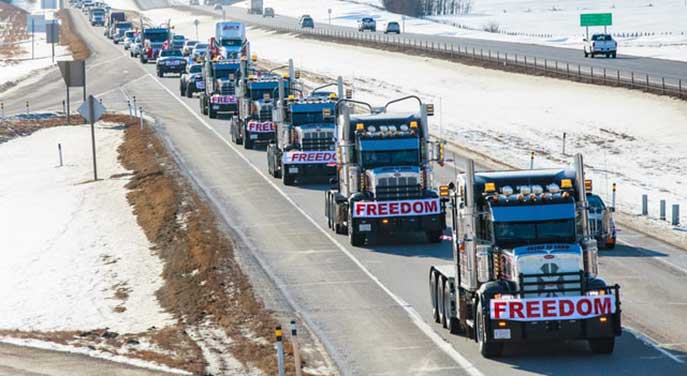 At one time, the coming together of workers to demand greater rights was seen as a positive thing by the left.
At one time, the coming together of workers to demand greater rights was seen as a positive thing by the left.
Among those rights was the right to work, as reflected in the Canadian Charter of Rights and Freedoms.
The Dominion Labor Party, United Farmers of Alberta, Progressive, Co-operative Commonwealth Federation (CCF), and the New Democratic Party (NDP) all supported powerful unions along with strikes and protests.
In fact, the CCF supported the On-to-Ottawa Trek in 1935, which Prime Minister R.B. Bennett characterized as “not a mere uprising against law and order but a definite revolutionary effort on the part of a group of men to usurp authority and destroy government.” Bennett met with eight trek leaders when they came to Ottawa, although they weren’t offered seats.
During the 2022 Freedom Convoy protest, on the other hand, the Canadian left abandoned its historic role as working-class champion. The trucking industry had warned Ottawa that imposing the COVID-19 vaccine mandate on truckers who drove alone across the border would create chaos and sideline tens of thousands of truckers and their supporters. But the Trudeau government imposed the mandate anyway.
 |
| Related Stories |
| Does Canada have a two-tiered system of justice?
|
| The allegations for invoking the Emergencies Act were baseless
|
| Elites are blowing their response to the freedom protests
|
The Freedom Convoy was a reaction to the imposition of that mandate. Protest leaders only wanted the government to account for its policy and have a public debate with those most directly impacted.
But instead of supporting the working class, the NDP endorsed imposing the Emergencies Act, even before it was debated.
It fell to former NDP MP Svend Robinson, who served as Justice critic when the act was passed to replace the War Measures Act, to comment two days after it was invoked on Feb. 14:
“I was in the House during 1988 debate on the act, when we were promised that ‘emergency powers can only be used when the situation is so drastic that no other law of Canada can deal with the situation.’ That test has not been met. The NDP can stop this. Will they?”
No current NDP caucus member echoed his view.
It was back in October 1970 that NDP leader Tommy Douglas, while agreeing that the FLQ kidnapping was serious, told Parliament the government had other options “to deal with it (FLQ crisis) under the powers which it now has under the laws of Canada. … There are very considerable powers there. I think the government deserves some criticism because some of those sections have not been used.”
The same could be said for the considerable powers the government had at its disposal in February. The invocation of the Emergencies Act was part of the hysteria, initiated by Prime Minister Justin Trudeau, warning Canadians about the dangers of sedition.
The “seditionists,” meanwhile, were shovelling snow, feeding the homeless, dancing, honking horns, soaking in a hot tub and cleaning streets. An Ontario judge even ruled the protest was legal.
Ultimately, on Feb. 12, the federal government and convoy leaders reached an agreement, and trucks began to move out of the downtown. But that didn’t stop the Trudeau government from invoking the Emergencies Act, not out of necessity but by choice.
The convoy protest reveals a growing class divide in Canada and a huge disconnect between the left and the working class: in other words, those they purport to represent.
The only path forward for the left is a return to championing peaceful, nonviolent protests and consultation with workers about policies that directly impact their livelihoods. It needs to admit that the convoy protest was not about terrorism and was not an insurrection. It needs to also ensure that the Emergencies Act is a last resort, not the first act of a desperate government bothered by dissent.
Ray McGinnis is a writer and author of Unanswered Questions and Writing the Sacred. Earlier in his career, Ray was a program staffer in education for the United Church of Canada, serving in several congregations as well as at the denomination’s national office (1986-95). This column was supplied by the Frontier Centre for Public Policy.
For interview requests, click here.
The opinions expressed by our columnists and contributors are theirs alone and do not inherently or expressly reflect the views of our publication.
© Troy Media
Troy Media is an editorial content provider to media outlets and its own hosted community news outlets across Canada.

